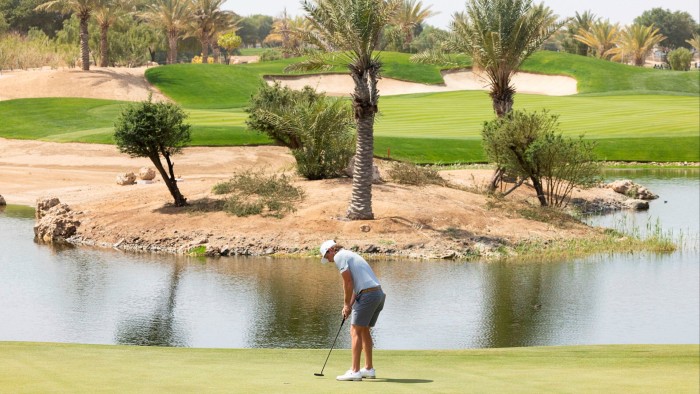Unlock the Editor’s Digest for free
Roula Khalaf, Editor of the FT, selects her favourite stories in this weekly newsletter.
Saudi Arabia is teaming up with BlackBerry co-founder Jim Balsillie in an effort to drive the kingdom’s below-par golf offerings out of the rough and on to the green of the sport’s big powers.
Canadian entrepreneur Balsillie is investing $100mn over the next five years to develop luxury golf resorts in the country, which has far fewer courses than the neighbouring United Arab Emirates. The deal falls under Saudi’s Vision 2030, a plan to diversify the kingdom’s oil-dependent economy through a “strategic shift” to tourism.
Balsillie told the Financial Times his strategy also involves an unusual pitch to the millions of Muslims who visit Saudi Arabia to make sacred pilgrimages to Mecca, but can extend their trip for a round of golf.
“Come for history, natural beauty, and legendary hospitality. Stay for golf and modern lifestyle,” said Balsillie, who owns Canada’s largest golf course operator, GolfNorth.
He sees long-term potential for up to 100 courses in Saudi Arabia, from about a dozen now, but is currently aiming for seven to 10 and hopes to complete some of them as soon as 2027.
“Groundbreaking is still a possibility for this year,” said Balsillie, who is partnering with real estate fund Sumou Global Investment to build hotels and residential complexes tied to the courses.

Golf has not traditionally been a major sport in football-loving Saudi Arabia. But it began growing rapidly after Yasir al-Rumayyan, an avid golfer and governor of Saudi’s giant Public Investment Fund, became president of the kingdom’s golf federation in 2017.
Riyadh-based executive Abdulrahman Harakati picked up the game while studying in the US nearly 15 years ago and now is on the course every weekend.
“Today, many Saudis play golf because [the golf federation] opened free training to everyone who wanted to learn, giving free lessons. It doesn’t matter that you don’t have your own golf clubs,” he said. “They brought in foreign coaches and welcomed men, women and children.”
Despite the dusty, desert climate, the sport has become big business across the Gulf.
The PIF has spent $3.9bn backing LIV, a breakaway tour that lured top golfers with big pay packages and caused an ongoing dispute with the PGA Tour. The fund is also building several courses, including one west of Riyadh designed by golf great Jack Nicklaus.
Meanwhile, the Trump Organization is investing in golf elsewhere in the Gulf, with a licensing deal in Qatar and a planned $500mn luxury resort and golf course in Oman.
“The question is why wasn’t this type of project done, say 10 or 20 years ago when Oman and UAE [were] doing the same thing?” Balsillie asked.
Both Sumou and Balsillie are funding the project while hoping to attract other investors. Balsillie said it was not receiving government funds or tax incentives, “but that might change down the road”.
Golf courses across the world face criticism over water and energy use, but those in the Gulf states say they aim to promote sustainable practices through water recycling, tree planting and using renewable energy. With low rates of rainfall and no natural rivers, Saudi Arabia and its neighbours are almost fully reliant on energy-intensive seawater desalination.
The first project will be built in a south-eastern suburb of the Red Sea port city of Jeddah. The location, known as Wadi Aslaa, used to be a dumping ground for sewage water.
While the government has sought to provide incentives to developers to build affordable housing as part of Crown Prince Mohammed bin Salman’s goal to increase home-ownership to 70 per cent by 2030, such “golf-living” developments target home buyers from upper middle class and luxury tourists.
“Our type of development is in line with the kingdom’s push for more tourism and more residential accommodations — golf ties it all together,” Balsillie said.
https://www.ft.com/content/63e0186c-2ad8-48f7-b023-393059afc708


